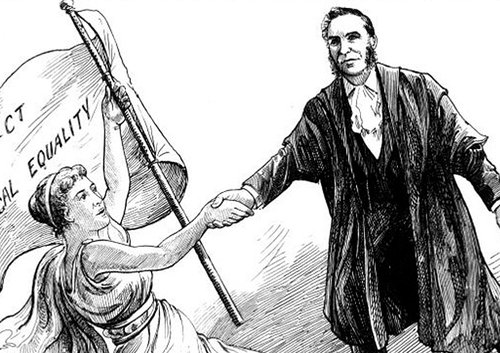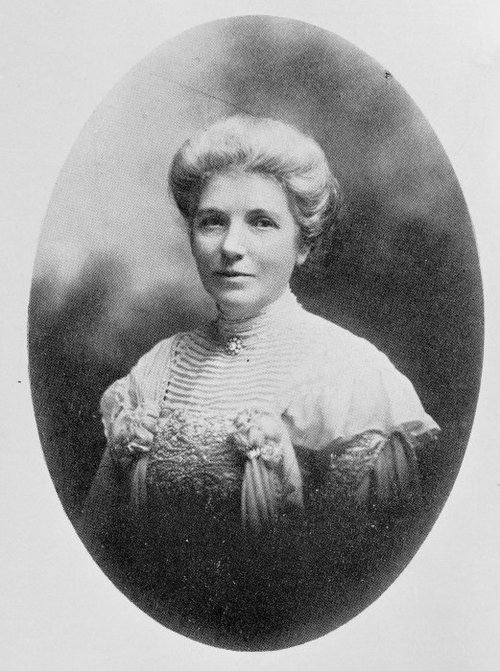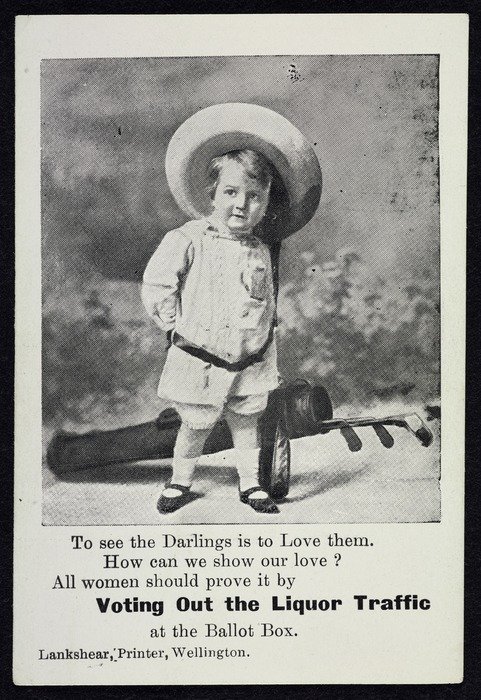
By Sarah Johnston
With the general election looming and the 124th anniversary of New Zealand women’s suffrage celebrated on Tuesday, this week seemed a good time to highlight first-hand accounts of this key moment in Aotearoa’s history, held in our sound archives.
Hero image: Engraving depicting a woman holding a flag which reads, 'Perfect Political Equality', with a man helping her up to what is labelled as the 'Parliamentary Heights' - New Zealand Graphic and Ladies' Journal on 21 July 1894 (Alexander Turnbull Library).

Portrait of Kate Shepherd - 1905 (Alexander Turnbill Library).
In 1968, Hilda Lovell-Smith of Christchurch was interviewed for radio about her memories of her mother Jennie, who was a close friend of Kate Sheppard and campaigned alongside her to get signatures on the Women's Suffrage Petition. This was eventually presented to Parliament with 32,000 signatures in 1893. Hilda was also a life-long campaigner for women’s rights. She was known as “Kitty”, after being given her middle name “Kate”, as a tribute Kate Sheppard. In this excerpt, she recalls her mother’s campaigning in rural Canterbury in the late 1890s.
Hilda Lovell-Smith shares memories of the campaign for women to get the vote in the general election in New Zealand on November 28, 1893 - Women’s Franchise (1968)
Although Hilda Lovell-Smith was too young to vote in 1893, we have other recordings with women who did take part in the historic event. 1968 was the 75th anniversary of New Zealand women getting the vote and in Auckland, three elderly women took part in a group interview for radio about their memories of that election.
Mrs Dixon says the men were worried women voters would vote for Prohibition - Women’s Enfranchisement (1963)
Mrs Dixon, who was 101 at the time of the interview, grew up at Parewanui, near Bulls in Rangitikei and peppers her lively recollections with a delightful chuckle.
Like her fellow interviewees, Mrs Dixon remembers how the temperance movement and the fight for women’s suffrage went hand-in-hand.

Temperance campaign postcard - 1908 (Alexander Turnbull Library).
Many New Zealand suffragists, such as Kate Sheppard, were members of the Women’s Christian Temperance Union, pushing for greater control of liquor sales, if not outright prohibition. Another woman voter in the 1968 recording is Miss Manktelow. She explains how the Methodist Church (or Wesleyans, as they were known at the time) also worked for suffrage.
Miss Manktelow talks about the Temperance movement and the drive for Prohibition which she says went hand in hand with the campaign for the franchise for women - Women’s Enfranchisement (1963)
Miss Manktelow recalled the forces opposing women getting the vote included the Premier (Prime Minister) of the day, Richard Seddon. He had the backing of the liquor lobby and had campaigned hard against women voting, on their behalf.
While many women voters of 1893 undoubtedly did support Prohibition, which came close to passing several times, it never quite got the majority required to ban alcohol nationally. But closure of all hotels was one of the many predicted consequences raised by opponents of women getting the vote.
In a radio broadcast made in the 1950s about the status of women, another voter of 1893 Helen Wilson, recalled the wild predictions about the effects of women voting: either national peace and harmony and elimination of corruption – or victory for handsome political candidates only!
A talk by Helen Wilson O.B.E. author of "My First 80 Years", who was also an early leader of the Women's Division of Federated Farmers - The Status of Woman (c1950)
Helen Wilson also signed Kate Sheppard’s suffrage petition, although she was quite conservative politically. She became involved in rural politics and later rose to become the president of the newly formed Women’s Division of Federated Farmers. You can hear more about her life and views in the full radio programme, at the link above.
Some of these sound recordings were included in Hot Words and Bold Retorts, a 2018 production from Gaylene Preston. Actors portray the women, lip-synching their recollections of suffrage.
For more on this subject, listen to 'Sound Archives: Suffrage Day' with RNZ’s Jesse Mulligan, or watch 'Hot Words and Bold Retorts' by Gaylene Preston.
Check out our exhibition 'Whakatū Wāhine' - Voices of Women Voters of 1893.